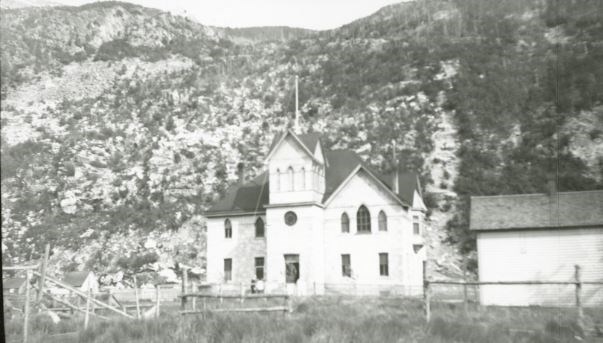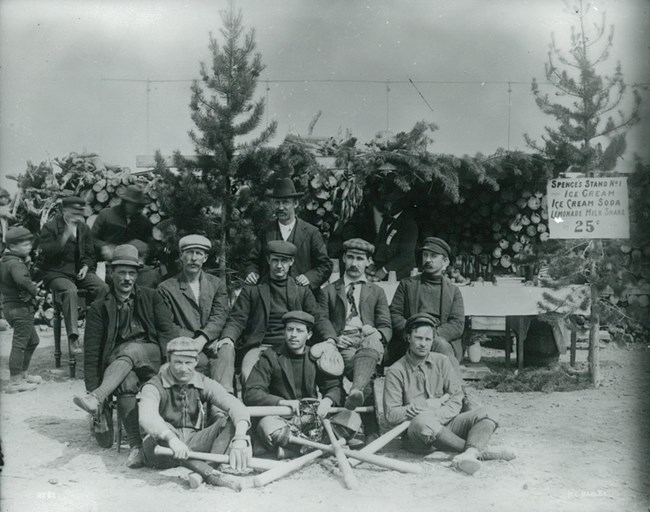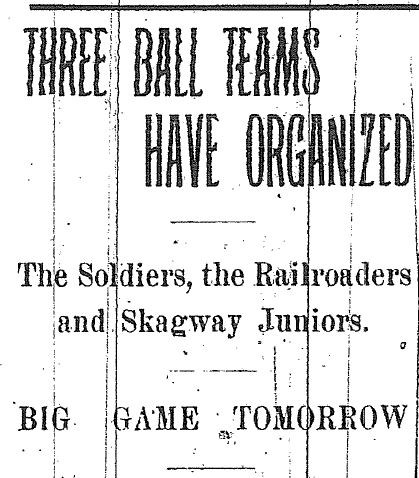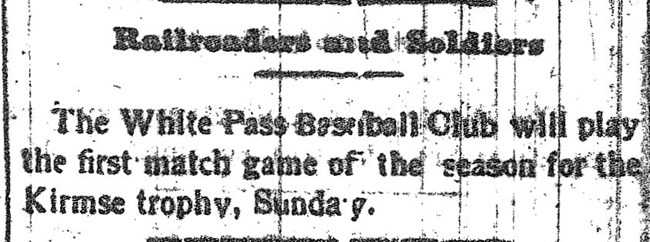
National Park Service, Klondike Gold Rush National Historical Park, Stinebaugh Collection, 0004.009.001.003hh A City of FirstsThe Klondike Gold Rush ushered in a great deal of firsts to Alaska. As a gateway to the gold rush, Skagway hosted many of them. In 1899 the state's first Young Men's Christian Association (Y.M.C.A.) arrived. By 1900 the city had the first school that provided college preparatory classes for high school students, McCabe College. Notably, Skagway also had Alaska's first African American baseball team. Skagway was the textbook definition of a boomtown in 1897. People from near and far ventured to this tiny glacial valley in the thousands with hopes of a better life. Skagway grew almost overnight from peaceful hunting grounds to a city in less than a month. One side effect of unrestricted development and population growth was the element of crime that plauged the city. Another outcome was high volume of foot traffic over the border between the United States and Canada and the border disputes that followed. Reports of border disputes in Alaska prompted the United States to send troops to nearby Dyea, and then Skagway. Company L of the 24th Infantry arrived in Skagway in July of 1899 and became another first: the first Buffalo Soldiers to serve in Alaska. 
Alaska State Library, Paul Sincic Photo Collection, P75-018 Recreation in the NorthOutside Company L’s daily duties, the soldiers began to settle into their new, abeit, temporary home in Skagway. Soon both the soldiers and the citizens of Skagway found themselves in need of recreational activities. The local Y.M.C.A. met some of those needs with its gymnasium, but the activity that caught the city's attention more than any other was the game of baseball. By 1899, baseball was the most popular game in the country. The entire history of the United States can be traced along the same lines of the growing popularity of a game called “rounders.” Rounders arrived with the first Europeans in the original 13 colonies. The game evolved over time, turning from a European game, to a separate and distinct American game. Because of the American Civil War, the already popular game of baseball became even more widespread. The war brought men from all over the country together to serve. These soldiers had very different experiences and backgrounds. Differences aside, they shared an understanding and appreciation of the game of “base.” Baseball was a universal connection that became a part of daily soldier life. When the war came to a close in 1865, the love of the game traveled home with these new veterans. The game not only grew in popularity, but spread. Once reserved for the upper-middle class, now the game was seen as something for the "every man." With the game's popularity throughout the country, it’s not very surprising that by 1900 Skagway had formed three teams of their own. 
The Daily Alaskan, May 19, 1900 Baseball Comes to SkagwayBy May 19, 1900 three teams formed: the Soldiers team, the Railroaders, and a junior league. The citizens in Skagway had great confidence in their Railroaders team. They wanted to settle the Canadian border dispute by an international game of baseball at nearby Bennett in British Columbia. The Skagway team won, but the border was not a part of the day’s winnings. This small town’s baseball story is even more interesting because of the soldier team. Company L was an all African American unit and by forming a team they became the first all black baseball team in Alaska. These soldiers played at a time when black men were banned from the professional league. It would be almost 50 years later before black men were once again allowed to play on a professional level. Despite the segregation of the game, many local and amateur teams of black ball players still existed in the United States, and Company L was one of them. The city of Skagway rallied behind their teams. The game was so enjoyed by spectators that the city developed its own baseball field. There would be no more playing on the beach at low tide, now a stadium was being constructed. By 1902 the grandstand was completed and even an admission was charged, twenty five cents bought a ticket to the games. 
The Daily Alaskan, May 9, 1902. An Alaskan Championship SeriesThe culmination of baseball in Skagway was the announcement of a championship series between the soldier team and the railroad team. A local curio shop, Kirmse’s, was the sponsor. Kirmse's ordered a 12 inch sterling silver trophy dubbed, “The Kirmse Cup,” for the championship winner. The championship series was played as best out of two games. On May 13, 1902 the first game of the championship. The scene was described as, “…crowd(s) in the bleachers and on the sideline of the soldiers, was large and such rooting as occurs in the East happened Sunday, when one side or the other made a brilliant play, and the supporters approved of the same by yelling themselves hoarse.”
Victory of the first game went to Company L, by the end of nine innings the score stood at 10-0. The local paper reported on the game, analyzing the plays saying, “This much can be said for the White Pass [railroaders’ team], they played hard. Their defeat was lack of team work.” While Company L's plays were described as, “The soldiers were good. They have practiced daily and were at home at the bat and at the diamond.” The tables turned in game two when the White Pass team rallied and defeated the soldiers by a score of 8-3. Speculation over the loss of the soldiers included their use of two new players and, as many modern fans can relate to, the pitching not holding up. The soldiers were eager to continue playing to break the tie. They even challenged the White Pass to another game, going so far as to offer them $50 ($1,400) to play a third game. Each soldier earned about $26 a month so offering $50 was equiviliant to over two month's wages. The White Pass team declined, stating they could not get time away from work to play another game. The two games were recorded as an even break, leaving no winner for the trophy. More than Just a GameIt is often the things you least expect that change a population into a community. Baseball acted as a bridge. It brought soldiers from different walks of life together in the American Civil War and it too brought the community of Skagway together. Baseball helped Company L become more than just a temporary guest in a far off town. It was the tool that allowed them to become accepted and assimilate to this new home in the north. |
Last updated: September 27, 2017
